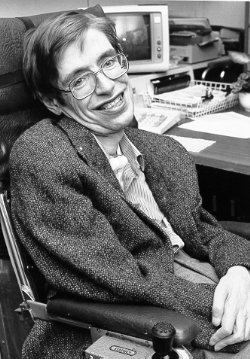 The eminent physicist Stephen Hawking died on March 14, 2018, at the age of 76, according to The New York Times (March 14, 2018). He was, as the Times's obituary explains, "his generation's leader in exploring gravity and the properties of black holes, the bottomless gravitational pits so deep and dense that not even light can escape them"; his 1974 paper on what is now known as Hawking radiation "is hailed by scientists as the first great landmark in the struggle to find a single theory of nature — to connect gravity and quantum mechanics, those warring descriptions of the large and the small." Hawking captured not only attention for his scientific work and his popularizations thereof but admiration for his achievements in spite of his disability: he was largely paralyzed during his adult life.
The eminent physicist Stephen Hawking died on March 14, 2018, at the age of 76, according to The New York Times (March 14, 2018). He was, as the Times's obituary explains, "his generation's leader in exploring gravity and the properties of black holes, the bottomless gravitational pits so deep and dense that not even light can escape them"; his 1974 paper on what is now known as Hawking radiation "is hailed by scientists as the first great landmark in the struggle to find a single theory of nature — to connect gravity and quantum mechanics, those warring descriptions of the large and the small." Hawking captured not only attention for his scientific work and his popularizations thereof but admiration for his achievements in spite of his disability: he was largely paralyzed during his adult life.
As a celebrity scientist, Hawking was widely quoted on and consulted about topics outside his professional specialty, including evolution and climate change. He was matter-of-fact about evolution: in George and the Unbreakable Code (2016), a children's book coauthored with his daughter Lucy Hawking, for example, he described the Origin of Species as "one of the most important scientific books ever written. It changed the way we see our world." He was also the three hundredth signatory of NCSE's Project Steve, a lighthearted demonstration of the scientific consensus on evolution. Hawking was also concerned about climate change, telling the BBC (July 2, 2017), "Climate change is one of the great dangers we face, and it's one we can prevent if we act now. By denying the evidence for climate change, and pulling out of the Paris Climate Agreement, Donald Trump will cause avoidable environmental damage to our beautiful planet, endangering the natural world, for us and our children."
Hawking was born in Oxford, England, on January 8, 1942. He received his B.A. in natural science from Oxford University in 1962. In 1963, he was diagnosed with amyotrophic lateral sclerosis and told that he had less than three years to live. Nevertheless, he earned his Ph.D. in applied mathematics and theoretical physics from Cambridge University in 1966. Hawking spent his bulk of his career at Cambridge University, where he was the Lucasian Professor of Mathematics from 1979 to 2009. In addition to his scientific publications, he wrote a number of popular works, including the best-selling A Brief History of Time (1988). He was the subject of a biographical film, The Theory of Everything (2014). His honors included election to the Royal Society of London and the Presidential Medal of Freedom in 2009.
March 15, 2018
